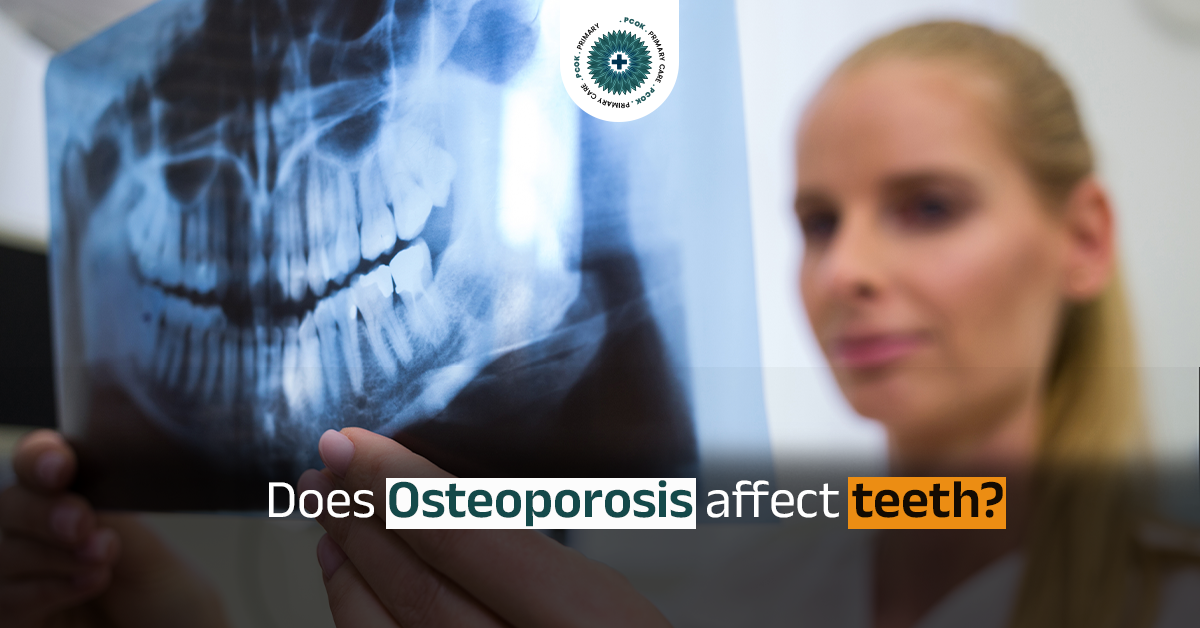Have you thought about osteoporosis, the silent bone wrecker? It might also harm your teeth. Many know osteoporosis weakens bones, but few wonder, “Does osteoporosis affect your teeth” Yes! The connection is tighter than you realize!
Osteoporosis is linked to tooth problems. Know the signs and how to prevent them. Let’s get started!
Concerned about osteoporosis and your teeth? At Primary Care of Kansas, we can help you keep your smile and bone health safe. Contact us today.
What Is Osteoporosis? A Simple Explanation
Osteoporosis slowly changes strong bones into fragile, sponge-like structures. Think of a solid brick wall becoming a sponge. This condition happens when the body loses too much bone or doesn’t create enough new bone. It mostly affects older adults, especially women after menopause. Still, anyone can be impacted by it. Now, you might be curious: “Can osteoporosis affect teeth?” Your jawbone holds the answer. It quietly supports your pearly whites.
How Osteoporosis and Teeth Are Connected?
Your teeth are like trees. They need a strong foundation, which is your jawbone. When osteoporosis strikes, that foundation weakens, leaving your teeth vulnerable.
-
Weak Jawbones Can’t Hold Teeth
Healthy jawbones stand firm, like anchors holding a ship in place. But osteoporosis thins the jawbone, making it a wobbly support for pearly whites. This can lead to decay or, worse yet, untimely tooth loss.
-
Receding Gums and Infections
Fragile bones can cause gums to retreat, creating secret hideouts for germs. This raises the threat of gum disease, a topic we will tackle next.
-
Dentures Might Stop Fitting
As the jawbone shrinks, dentures—your trusty false teeth—may slip and slide. This discomfort is a glaring sign of bone loss.
So, does osteoporosis affect your teeth? Absolutely—it’s all about the jawbone!
Osteoporosis Teeth Symptoms: Don’t Ignore These Signs
Curious if osteoporosis is affecting your teeth? Check for these signs:
- Teeth that feel loose, without an injury.
- Gums that bleed when you brush or floss—a red flag.
- Aches while chewing—like your teeth are trying to dance.
- Dentures suddenly out of sync? That might mean your jawbone is shrinking.
- A whiff of bad breath or a bitter taste might signal hidden gum disease.
If this sounds all too familiar, don’t delay! Visit your dentist or doctor ASAP. A swift appointment could be the secret to preserving your radiant smile!
The Dangerous Cycle: Osteoporosis and Gum Disease
Osteoporosis and gum disease often work together to harm your mouth. Here’s why:
- Osteoporosis weakens jawbones, causing gums to pull back. This opens the door for bacteria to harm tooth roots.
- Gum disease ignites inflammation, setting off a chain reaction. This inflammation can hasten bone loss in your jaw.
It’s a snowball effect—harmful to both your bones and teeth! To stop this cycle:
- Sparkle your smile by brushing twice daily and flossing for fabulous gums.
- Chat with your dentist about mouthwashes and treatments customized for you.
- Schedule regular check-ups to outsmart gum disease before it strikes.
Can Osteoporosis Affect Your Teeth Even With Good Care?
You might brush, floss, and avoid sweets—but can osteoporosis affect your teeth even then? Sadly, yes. Osteoporosis weakens the foundation (your jawbone), not just the teeth. Imagine building a house on the sand: even perfect walls (teeth) will struggle if the base (bone) crumbles. That’s why protecting your bones is just as important as brushing!
Treatment for Tooth Bone Loss: How to Fix the Damage
If you already have bone decay in teeth or loose teeth, don’t panic! Modern dentistry offers solutions. Here’s the best treatment for tooth bone loss:
-
Dental Implants
Picture titanium screws acting like sturdy anchors, holding your new pearly whites. They mimic natural roots, but a solid jawbone is essential for success.
-
Bone Grafts
Think of bone grafts as reinforcements. Surgeons add bone—either your own or a donor’s—fortifying your jaw like a sturdy fortress.
-
Medications
Medication can be your ally; drugs like bisphosphonates help slow bone loss. Yet, some may impact your jaw, so consult your doctor before diving in.
-
Gum Disease Treatments
A deep cleaning or a dose of antibiotics can halt the march of infection. These treatments stand guard against further bone loss.
Your dentist and doctor will create a plan just for you.
Prevention Tips: Protect Your Bones and Teeth
Want to avoid problems with osteoporosis and teeth? Start with these easy steps:
-
Eat Bone-Friendly Foods
- Calcium: Embrace dairy, leafy greens, and almonds to fortify bones and teeth.
- Vitamin D: Soak up sunlight or savor fatty fish and eggs for calcium magic.
- Protein: Lean meats, beans, and tofu help repair bones and gums.
-
Exercise Regularly
- Walking, dancing, or lifting weights strengthens bones.
- Even simple activities like gardening count!
-
Avoid Smoking and Alcohol
Both weaken bones and harm gums.
-
Visit Your Dentist Twice a Year
They can spot early signs of gum disease or bone loss.
Final Thoughts: Your Smile Deserves Strong Bones!
So, does osteoporosis affect your teeth? Yes—it’s a sneaky threat to your smile. But knowledge is power! Nourish your body, keep moving, and partner with your healthcare providers. This trio is your shield, guarding those precious bones and gleaming teeth.
Remember, your body is a symphony of connections. Strong bones lead to a bright smile, and a bright smile brings joy to your life!
FAQs
Does osteoporosis impact your teeth more than other bones?
The spine and hips are most at risk, but jawbones can weaken too. Regular dental visits help catch jawbone issues early.
Can osteoporosis affect your teeth years before you notice?
Yes! Bone loss is slow and silent. That’s why check-ups matter.


No comment